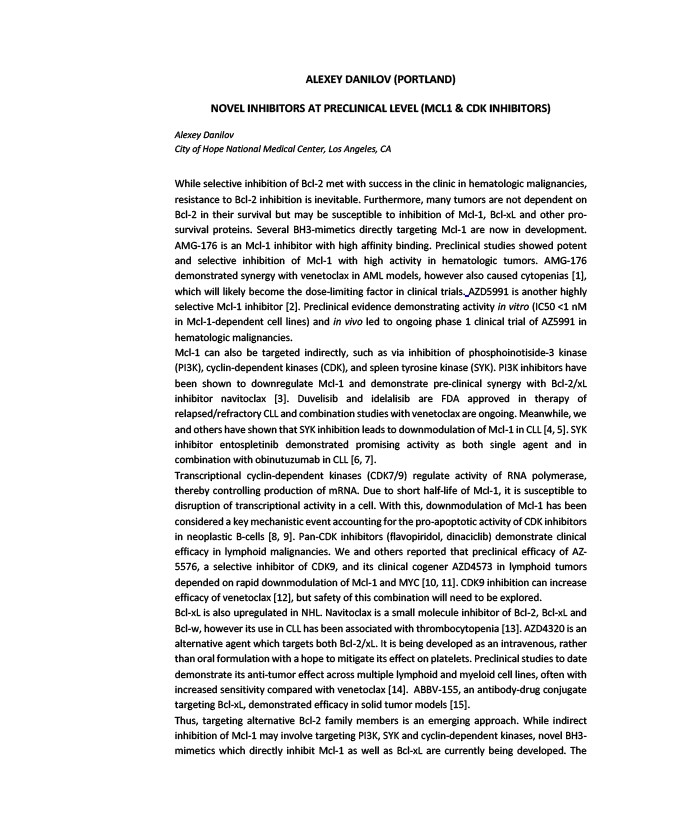
ALEXEY DANILOV (PORTLAND)
NOVEL INHIBITORS AT PRECLINICAL LEVEL (MCL1 & CDK INHIBITORS)
Alexey Danilov
City of Hope National Medical Center, Los Angeles, CA
While selective inhibition of Bcl-2 met with success in the clinic in hematologic malignancies,
resistance to Bcl-2 inhibition is inevitable. Furthermore, many tumors are not dependent on
Bcl-2 in their survival but may be susceptible to inhibition of Mcl-1, Bcl-xL and other pro-survival
proteins. Several BH3-mimetics directly targeting Mcl-1 are now in development.
AMG-176 is an Mcl-1 inhibitor with high affinity binding. Preclinical studies showed potent
and selective inhibition of Mcl-1 with high activity in hematologic tumors. AMG-176
demonstrated synergy with venetoclax in AML models, however also caused cytopenias 1,
which will likely become the dose-limiting factor in clinical trials. AZD5991 is another highly
selective Mcl-1 inhibitor 2. Preclinical evidence demonstrating activity in vitro (IC50 <1 nM
in Mcl-1-dependent cell lines) and in vivo led to ongoing phase 1 clinical trial of AZ5991 in
hematologic malignancies.
Mcl-1 can also be targeted indirectly, such as via inhibition of phosphoinotiside-3 kinase
(PI3K), cyclin-dependent kinases (CDK), and spleen tyrosine kinase (SYK). PI3K inhibitors have
been shown to downregulate Mcl-1 and demonstrate pre-clinical synergy with Bcl-2/xL
inhibitor navitoclax 3. Duvelisib and idelalisib are FDA approved in therapy of
relapsed/refractory CLL and combination studies with venetoclax are ongoing. Meanwhile, we
and others have shown that SYK inhibition leads to downmodulation of Mcl-1 in CLL 4, 5. SYK
inhibitor entospletinib demonstrated promising activity as both single agent and in
combination with obinutuzumab in CLL 6, 7.
Transcriptional cyclin-dependent kinases (CDK7/9) regulate activity of RNA polymerase,
thereby controlling production of mRNA. Due to short half-life of Mcl-1, it is susceptible to
disruption of transcriptional activity in a cell. With this, downmodulation of Mcl-1 has been
considered a key mechanistic event accounting for the pro-apoptotic activity of CDK inhibitors
in neoplastic B-cells 8, 9. Pan-CDK inhibitors (flavopiridol, dinaciclib) demonstrate clinical
efficacy in lymphoid malignancies. We and others reported that preclinical efficacy of AZ-
5576, a selective inhibitor of CDK9, and its clinical cogener AZD4573 in lymphoid tumors
depended on rapid downmodulation of Mcl-1 and MYC 10, 11. CDK9 inhibition can increase
efficacy of venetoclax 12, but safety of this combination will need to be explored.
Bcl-xL is also upregulated in NHL. Navitoclax is a small molecule inhibitor of Bcl-2, Bcl-xL and
Bcl-w, however its use in CLL has been associated with thrombocytopenia 13. AZD4320 is an
alternative agent which targets both Bcl-2/xL. It is being developed as an intravenous, rather
than oral formulation with a hope to mitigate its effect on platelets. Preclinical studies to date
demonstrate its anti-tumor effect across multiple lymphoid and myeloid cell lines, often with
increased sensitivity compared with venetoclax 14. ABBV-155, an antibody-drug conjugate
targeting Bcl-xL, demonstrated efficacy in solid tumor models 15.
Thus, targeting alternative Bcl-2 family members is an emerging approach. While indirect
inhibition of Mcl-1 may involve targeting PI3K, SYK and cyclin-dependent kinases, novel BH3-
mimetics which directly inhibit Mcl-1 as well as Bcl-xL are currently being developed. The